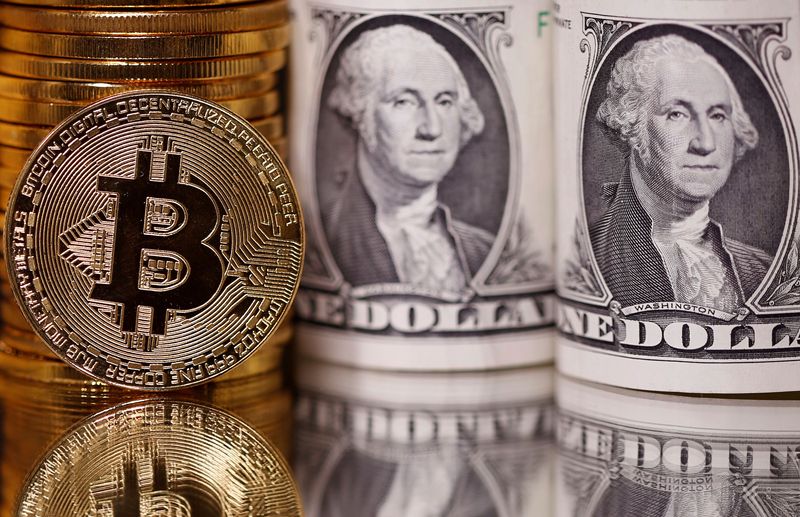
Written by Michael S. Darby and Ann Safir
NEW YORK (Reuters) – Federal Reserve Chairman Jerome Powell said on Wednesday the U.S. central bank would not get involved in the government's efforts to stockpile large amounts of bitcoin.
“We are not allowed to own Bitcoin,” Powell said in a press conference after the Fed's recent two-day policy meeting, adding that while policymakers cut interest rates as expected, they will continue to do so in the coming months. This suggests that the direction of monetary policy is more uncertain.
As for the legal issues surrounding Bitcoin holdings, Powell said, “That's something for Congress to consider, but we're not asking the Fed to change the law.”
The Fed president was referring to the possibility that the central bank could become involved in the government's initiative to create a so-called strategic reserve fund after President-elect Donald Trump takes office.
Powell's comments on Wednesday, along with other crypto assets, have been on the rise since Trump's victory in the Nov. 5 election, with the prospect of a more intrusive government approach to an asset class that barely functions as real money. damaged the value of the coin. , but instead it is mainly used as a means of speculation.
President Trump has suggested creating a US Bitcoin Strategic Reserve, but the concept is also widely rejected in Europe.
The president-elect has not provided any details about what such reserves would mean, but his initial holdings will include about 200 million bitcoins seized from criminals, worth about $21 billion at current prices. It has been stated that this could include a stockpile of 10,000 tokens.
Bitcoin has more than doubled this year to more than $100,000 on optimism about President Trump's push for cryptocurrencies. The asset has proven volatile in its 15 years of existence, with analysts saying its usefulness as a store of value and unit of exchange, a key characteristic of a reserve currency, has declined. are.
Republican Sen. Cynthia Lummis has introduced a bill to create such a reserve, under which the U.S. Treasury would purchase 200,000 Bitcoins annually until the reserve reaches 1 million tokens. It turns out. The purchase will be funded by the Fed's bank deposits and gold holdings.
Funding the Strategic Bitcoin Reserve will likely require Congressional approval and the issuance of new Treasury bonds, according to an analysis published this week by Barclays (LON:). Barclays analysts said that given the way such a reserve would likely be created, “we suspect such a plan would face stiff resistance from the Fed.”
Europe opposes Bitcoin reserves
More broadly, Fed officials are skeptical of securities such as Bitcoin, have prioritized allowing the private sector to innovate in payments technology, and are concerned about their own efforts to create an all-digital dollar. It's retreating.
The Fed's primary role regarding cryptocurrencies appears to be focused on how those assets impact the safety of consumers and the banking sector.
“We regulate and supervise banks, and we want to ensure that their interactions with crypto businesses do not threaten the health or well-being of banks,” Powell said on December 4. Regarding crypto assets, he said, “We do not directly regulate them.''
Claudia Buch, the European Central Bank's chief banking supervisor, also pointed out risks in the crypto market on Tuesday, including “excessive leverage, opacity (and) conflicts of interest,” and said she would closely monitor such exposures by banks. Of the assets he added.
President Trump appoints former PayPal (NASDAQ:) executive David Sachs to the newly created post of White House AI and crypto czar, and appoints cryptocurrency promotion consultant Paul Atkins as chairman of the Securities and Exchange Commission. I plan to.
In Europe, a series of central bankers this week rejected any proposal for Bitcoin to become a reserve asset.
Belgian Central Bank Governor Pierre Wunche said in an interview on Wednesday that there is little “desire to hold reserves in Bitcoin.” Outside the eurozone, Hungary's incoming governor Mihaly Varga said on Monday that cryptocurrencies are too volatile.
ECB policy committee member Ori Rehn said on Tuesday: “We are closely following the post-election debate in the United States in particular.” “However, our view remains unchanged: cryptocurrencies are assets, but not currencies,” added the Governor of the Central Bank of Finland.


